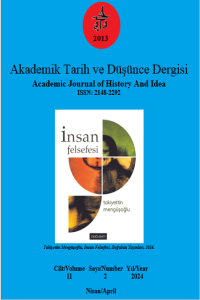Öz
Kültür, kendi doğası açısından tarihseldir. Onun bugünü geçmişe dayanır ve aynı zamanda o, geleceğin temelini oluşturur. Kültür tarihi insanlık tarihi kadar eskidir. Dünyanın hiçbir yerinde medeniyetsiz bir halk olmamıştır, yoktur ve olamaz. Büyüklüğü veya küçüklüğü ne olursa olsun, dünyadaki tüm halklar kendi kültürlerini yaratmışlardır. Sosyal deneyimin bir nesilden diğerine aktarılması kültürün yardımıyla gerçekleşir. Bilginin mekân ve zamanda aktarımı hem manevi, hem de maddi kültürle açıklanmaktadır. Kültürün normatif yönünü yansıtan gerçeklerden biri de gelenek ve görenekler, örf ve adetlerdir. Gelenek ve görenekler nesilden nesile aktarılan davranışsal bir normlar sistemidir. Belli bir örnek biçimi alan örf ve adetler, daha dayanıklı bir karaktere sahip olup yüzyıldan yüzyıla devredilmektedir. Tarihsel olaylar ve tarihsel süreçler bazen gelenekleri etkileyerek bir takım değişikliklere neden olabiliyor. Bununla birlikte insanların hafızasındaki fosilleşmiş örnekler, eski insanın düşünce biçimini, yaşadığı ortamı, davranış kültürünün temel özelliklerini incelemek açısından büyük önem taşımaktadır. Çünkü bu örneklerde her milletin kendine has gelenekleri vardır.
Anahtar Kelimeler
Kaynakça
- Azərbaycan etnoqrafiyası. (2007). 3 cilddə, 3 cild, Şərq-Qərb.
- Bəydili, (Məmmədov) C. (2003). Türk mifoloji sözlüyü. Elm.
- Biderman, G. (2007). Entsiklopediya simvolov. G. M. Biderman. M. Prosveshcheniye.
- Fontana, D. (2011). Taynyy yazyk snovideniy. Klyuch k zagadkam podsoznaniya. Kontent.
- Ozhegov, S. I., Shvedova N. ya. (2000). Tolkovyy slovar' Az.
- Roshal', V. M. (2008). Entsiklopediya simvolov, Sankt-Peterburg.
- Rzasoy, S. (2004). Oğuz mifinin paradiqmaları. Səda.
- Rzasoy, S. (2015). Azərbaycan dastanlarında şaman-qəhrəman arxetipi (“Əsli və Kərəm” və “Dədə Qorqud”). Elm və təhsil.
- Sergeyev, V. I. (2015). Lingotaktika, lingotaktika i lingotaktika. Izd-vo Chuvash.
- Sheynina, Ye.YA. (2003). Entsiklopediya simvolov. Ye.YA. Sheynina. - M. OOO. Izdatel'stvo AST. Trosing.
- Velikiye illyuzii nashego mira. (2014). Tayny, simvoly i znaki mirovoy istorii. M. Riderz Daydzhest,.
Öz
Culture is historical in its nature. Its present is based on the past and at the same time it is the basis for the future. The history of culture is as old as the history of mankind. There has never been, is not and cannot be a people without civilisation anywhere in the world. All peoples of the world, regardless of their size or smallness, have created their own culture. The transmission of social experience from one generation to the next takes place with the help of culture. The transmission of knowledge in space and time is explained by both spiritual and material culture. One of the facts reflecting the normative aspect of culture is traditions and customs, customs and traditions. Traditions and customs are a system of behavioural norms transmitted from generation to generation. Customs and traditions, which take the form of a certain example, have a more durable character and are passed on from century to century. Historical events and historical processes can sometimes affect traditions and cause some changes. However, fossilised examples in people's memory are of great importance in terms of examining the way of thinking of ancient people, the environment they lived in and the basic characteristics of behavioural culture. Because each nation has its own traditions in these examples.
Kaynakça
- Azərbaycan etnoqrafiyası. (2007). 3 cilddə, 3 cild, Şərq-Qərb.
- Bəydili, (Məmmədov) C. (2003). Türk mifoloji sözlüyü. Elm.
- Biderman, G. (2007). Entsiklopediya simvolov. G. M. Biderman. M. Prosveshcheniye.
- Fontana, D. (2011). Taynyy yazyk snovideniy. Klyuch k zagadkam podsoznaniya. Kontent.
- Ozhegov, S. I., Shvedova N. ya. (2000). Tolkovyy slovar' Az.
- Roshal', V. M. (2008). Entsiklopediya simvolov, Sankt-Peterburg.
- Rzasoy, S. (2004). Oğuz mifinin paradiqmaları. Səda.
- Rzasoy, S. (2015). Azərbaycan dastanlarında şaman-qəhrəman arxetipi (“Əsli və Kərəm” və “Dədə Qorqud”). Elm və təhsil.
- Sergeyev, V. I. (2015). Lingotaktika, lingotaktika i lingotaktika. Izd-vo Chuvash.
- Sheynina, Ye.YA. (2003). Entsiklopediya simvolov. Ye.YA. Sheynina. - M. OOO. Izdatel'stvo AST. Trosing.
- Velikiye illyuzii nashego mira. (2014). Tayny, simvoly i znaki mirovoy istorii. M. Riderz Daydzhest,.
Ayrıntılar
| Birincil Dil | Türkçe |
|---|---|
| Konular | Türk Bozkır Kültürü |
| Bölüm | Makaleler |
| Yazarlar | |
| Erken Görünüm Tarihi | 10 Mayıs 2024 |
| Yayımlanma Tarihi | 7 Haziran 2024 |
| Gönderilme Tarihi | 6 Ocak 2024 |
| Kabul Tarihi | 15 Şubat 2024 |
| Yayımlandığı Sayı | Yıl 2024 Cilt: 11 Sayı: 2 |

